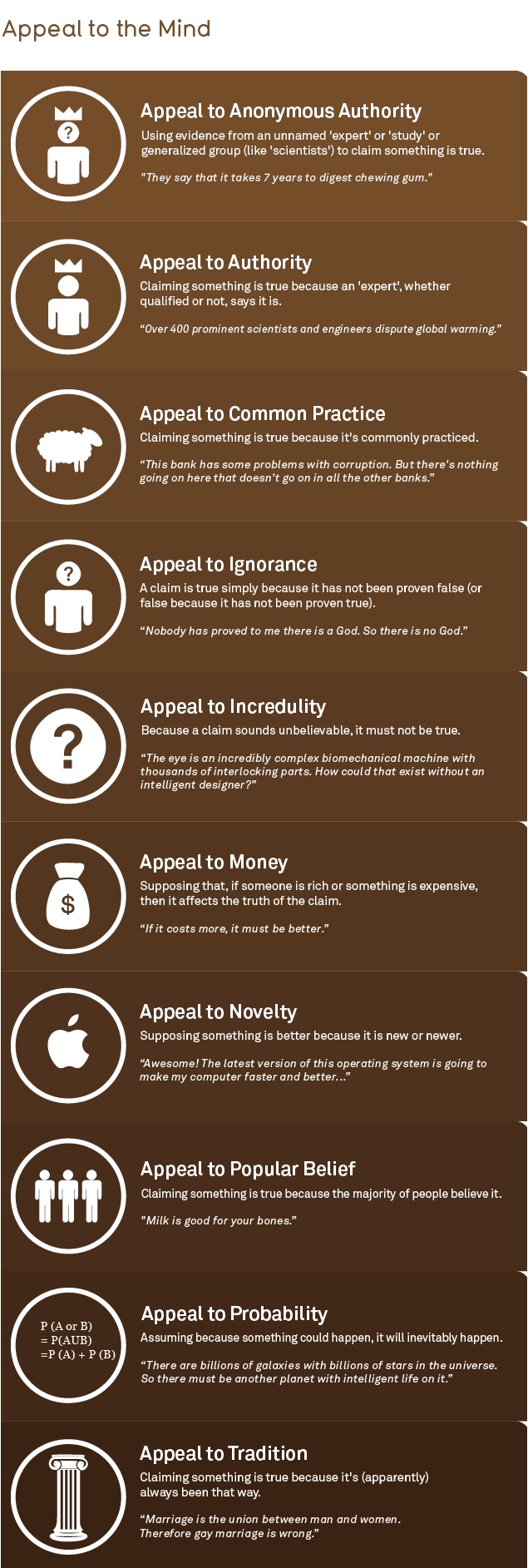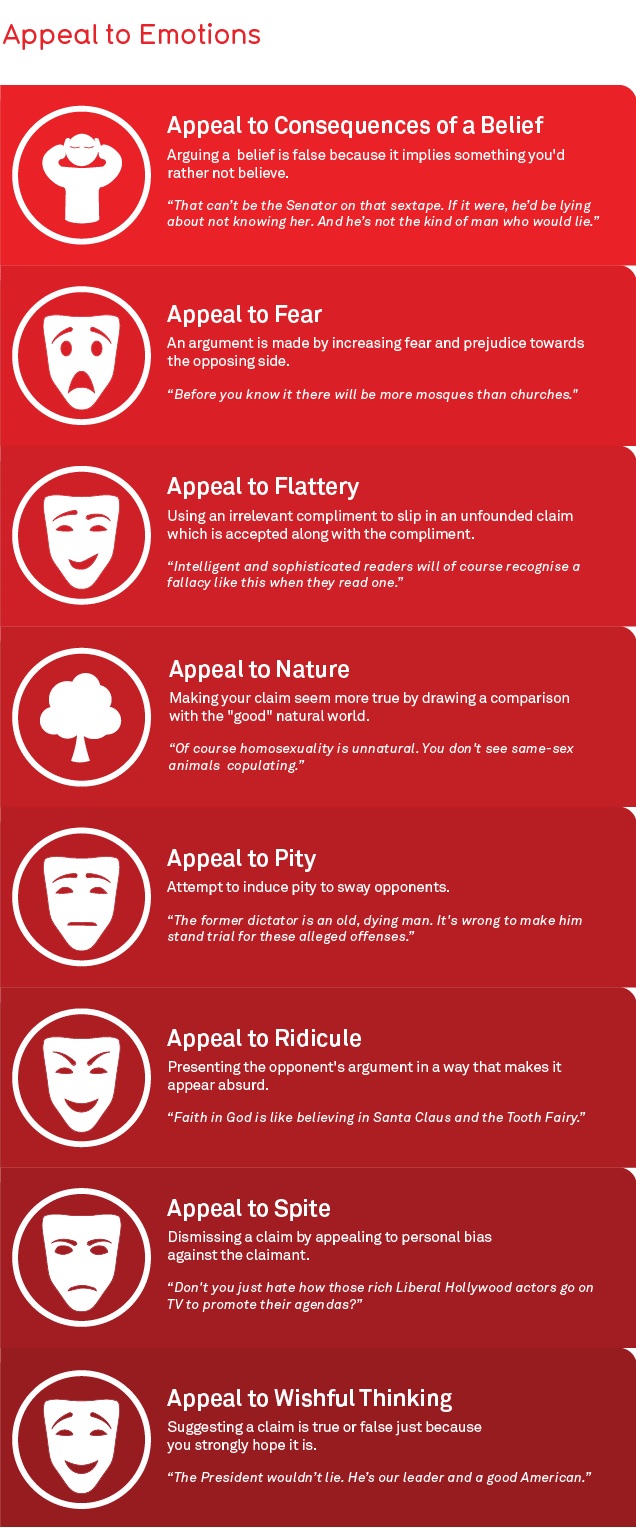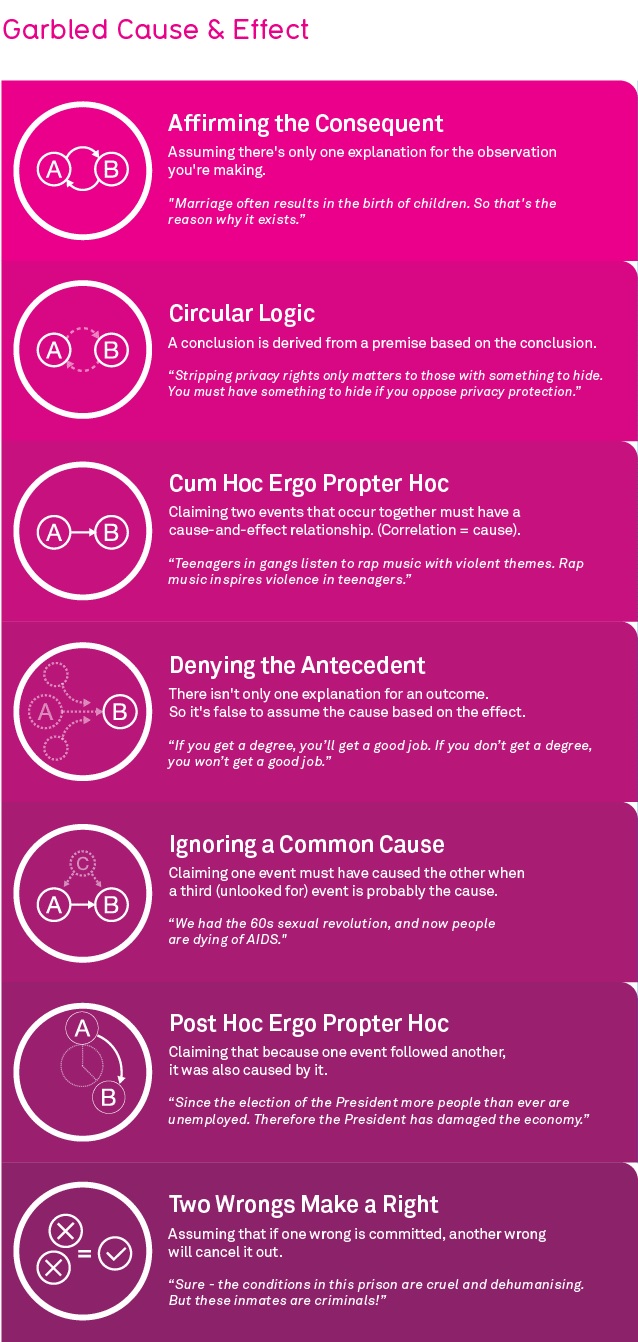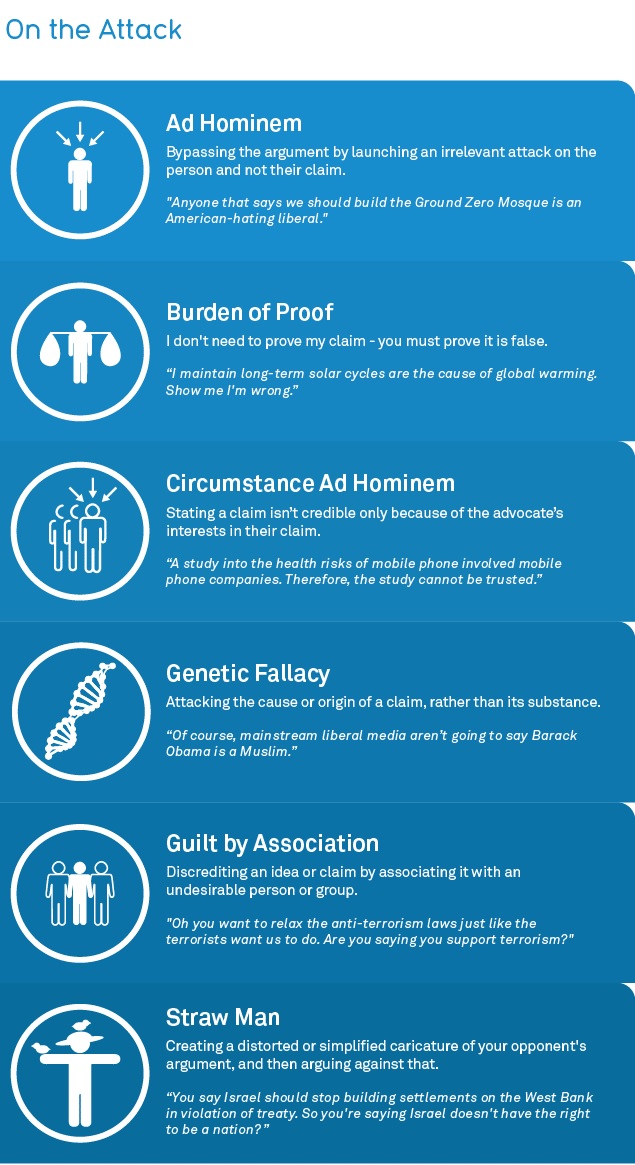Σκόνταψα πρόσφατα πάνω σε αυτό, που αποτελεί μια περιγραφή των διαφόρων, όχι και τόσο ευθέων, τρόπων που μπορούν να χρησιμοποιηθούν για να υποστηριχθεί κάποιο επιχείρημα σε μια συζήτηση, και είπα να το καταθέσω. Διαβάστε το, αν έχετε χρόνο.
Index of Logical Fallacies
Fallacies of Distraction:
False Dilemma: two choices are given when in fact there are three options
From Ignorance: because something is not known to be true, it is assumed to be false
Slippery Slope: a series of increasingly unacceptable consequences is drawn
Complex Question: two unrelated points are conjoined as a single proposition
Appeals to Motives in Place of Support
Appeal to Force: the reader is persuaded to agree by force
Appeal to Pity: the reader is persuaded to agree by sympathy
Consequences: the reader is warned of unacceptable consequences
Prejudicial Language: value or moral goodness is attached to believing the author
Popularity: a proposition is argued to be true because it is widely held to be true
Changing the Subject:
Attacking the Person:
(1) the person's character is attacked
(2) the person's circumstances are noted
(3) the person does not practice what is preached
Appeal to Authority:
(1) the authority is not an expert in the field
(2) experts in the field disagree
(3) the authority was joking, drunk, or in some other way not being serious
Anonymous Authority: the authority in question is not named
Style Over Substance: the manner in which an argument (or arguer) is presented is felt to affect the truth of the conclusion
Inductive Fallacies:
Hasty Generalization: the sample is too small to support an inductive generalization about a population
Unrepresentative Sample: the sample is unrepresentative of the sample as a whole
False Analogy: the two objects or events being compared are relevantly dissimilar
Slothful Induction: the conclusion of a strong inductive argument is denied despite the evidence to the contrary
Fallacy of Exclusion: evidence which would change the outcome of an inductive argument is
excluded from consideration
Fallacies Involving Statistical Syllogisms:
Accident: a generalization is applied when circumstances suggest that there should be an exception
Converse Accident : an exception is applied in circumstances where a generalization should apply
Causal Fallacies:
Post Hoc: because one thing follows another, it is held to cause the other
Joint effect: one thing is held to cause another when in fact they are both the joint effects of an underlying cause
Insignificant: one thing is held to cause another, and it does, but it is insignificant compared to other causes of the effect
Wrong Direction: the direction between cause and effect is reversed
Complex Cause: the cause identified is only a part of the entire cause of the effect
Missing the Point:
Begging the Question: the truth of the conclusion is assumed by the premises
Irrelevant Conclusion: an argument in defense of one conclusion instead proves a different conclusion
Straw Man: the author attacks an argument different from (and weaker than) the opposition's best argument
Fallacies of Ambiguity:
Equivocation: the same term is used with two different meanings
Amphiboly: the structure of a sentence allows two different interpretations
Accent: the emphasis on a word or phrase suggests a meaning contrary to what the sentence actually says
Category Errors:
Composition: because the attributes of the parts of a whole have a certain property, it is argued that the whole has that property
Division: because the whole has a certain property, it is argued that the parts have that property.
Non Sequitur:
Affirming the Consequent: any argument of the form: If A then B, B, therefore A
Denying the Antecedent: any argument of the form: If A then B, Not A, thus Not B
Inconsistency: asserting that contrary or contradictory statements are both true
Syllogistic Errors:
Fallacy of Four Terms: a syllogism has four terms
Undistributed Middle: two separate categories are said to be connected because they share a common property
Illicit Major: the predicate of the conclusion talks about all of something, but the premises only mention some cases of the term in the predicate
Illicit Minor: the subject of the conclusion talks about all of something, but the premises only mention some cases of the term in the subject
Fallacy of Exclusive Premises: a syllogism has two negative premises
Fallacy of Drawing an Affirmative Conclusion From a Negative Premise: as the name implies
Existential Fallacy: a particular conclusion is drawn from universal premises
Fallacies of Explanation:
Subverted Support (The phenomenon being explained doesn't exist)
Non-support (Evidence for the phenomenon being explained is biased)
Untestability (The theory which explains cannot be tested)
Limited Scope (The theory which explains can only explain one thing)
Limited Depth (The theory which explains does not appeal to underlying causes)
Fallacies of Definition:
Too Broad (The definition includes items which should not be included)
Too Narrow (The definition does not include all the items which should be included)
Failure to Elucidate (The definition is more difficult to understand than the word or concept being defined)
Circular Definition (The definition includes the term being defined as a part of the definition)
Conflicting Conditions (The definition is self-contradictory)
Index of Logical Fallacies
Fallacies of Distraction:
False Dilemma: two choices are given when in fact there are three options
From Ignorance: because something is not known to be true, it is assumed to be false
Slippery Slope: a series of increasingly unacceptable consequences is drawn
Complex Question: two unrelated points are conjoined as a single proposition
Appeals to Motives in Place of Support
Appeal to Force: the reader is persuaded to agree by force
Appeal to Pity: the reader is persuaded to agree by sympathy
Consequences: the reader is warned of unacceptable consequences
Prejudicial Language: value or moral goodness is attached to believing the author
Popularity: a proposition is argued to be true because it is widely held to be true
Changing the Subject:
Attacking the Person:
(1) the person's character is attacked
(2) the person's circumstances are noted
(3) the person does not practice what is preached
Appeal to Authority:
(1) the authority is not an expert in the field
(2) experts in the field disagree
(3) the authority was joking, drunk, or in some other way not being serious
Anonymous Authority: the authority in question is not named
Style Over Substance: the manner in which an argument (or arguer) is presented is felt to affect the truth of the conclusion
Inductive Fallacies:
Hasty Generalization: the sample is too small to support an inductive generalization about a population
Unrepresentative Sample: the sample is unrepresentative of the sample as a whole
False Analogy: the two objects or events being compared are relevantly dissimilar
Slothful Induction: the conclusion of a strong inductive argument is denied despite the evidence to the contrary
Fallacy of Exclusion: evidence which would change the outcome of an inductive argument is
excluded from consideration
Fallacies Involving Statistical Syllogisms:
Accident: a generalization is applied when circumstances suggest that there should be an exception
Converse Accident : an exception is applied in circumstances where a generalization should apply
Causal Fallacies:
Post Hoc: because one thing follows another, it is held to cause the other
Joint effect: one thing is held to cause another when in fact they are both the joint effects of an underlying cause
Insignificant: one thing is held to cause another, and it does, but it is insignificant compared to other causes of the effect
Wrong Direction: the direction between cause and effect is reversed
Complex Cause: the cause identified is only a part of the entire cause of the effect
Missing the Point:
Begging the Question: the truth of the conclusion is assumed by the premises
Irrelevant Conclusion: an argument in defense of one conclusion instead proves a different conclusion
Straw Man: the author attacks an argument different from (and weaker than) the opposition's best argument
Fallacies of Ambiguity:
Equivocation: the same term is used with two different meanings
Amphiboly: the structure of a sentence allows two different interpretations
Accent: the emphasis on a word or phrase suggests a meaning contrary to what the sentence actually says
Category Errors:
Composition: because the attributes of the parts of a whole have a certain property, it is argued that the whole has that property
Division: because the whole has a certain property, it is argued that the parts have that property.
Non Sequitur:
Affirming the Consequent: any argument of the form: If A then B, B, therefore A
Denying the Antecedent: any argument of the form: If A then B, Not A, thus Not B
Inconsistency: asserting that contrary or contradictory statements are both true
Syllogistic Errors:
Fallacy of Four Terms: a syllogism has four terms
Undistributed Middle: two separate categories are said to be connected because they share a common property
Illicit Major: the predicate of the conclusion talks about all of something, but the premises only mention some cases of the term in the predicate
Illicit Minor: the subject of the conclusion talks about all of something, but the premises only mention some cases of the term in the subject
Fallacy of Exclusive Premises: a syllogism has two negative premises
Fallacy of Drawing an Affirmative Conclusion From a Negative Premise: as the name implies
Existential Fallacy: a particular conclusion is drawn from universal premises
Fallacies of Explanation:
Subverted Support (The phenomenon being explained doesn't exist)
Non-support (Evidence for the phenomenon being explained is biased)
Untestability (The theory which explains cannot be tested)
Limited Scope (The theory which explains can only explain one thing)
Limited Depth (The theory which explains does not appeal to underlying causes)
Fallacies of Definition:
Too Broad (The definition includes items which should not be included)
Too Narrow (The definition does not include all the items which should be included)
Failure to Elucidate (The definition is more difficult to understand than the word or concept being defined)
Circular Definition (The definition includes the term being defined as a part of the definition)
Conflicting Conditions (The definition is self-contradictory)







